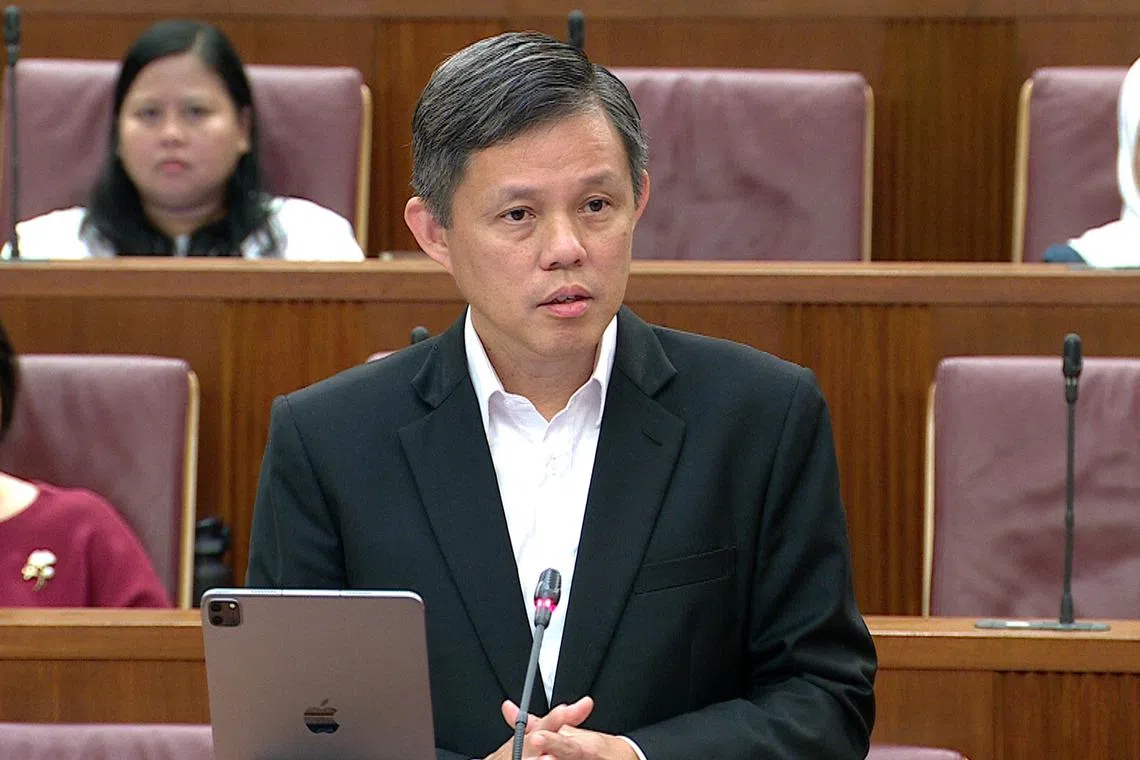Israel-Hamas lessons to be further customised by age group, teachers to get more support: Chan Chun Sing
Sign up now: Get ST's newsletters delivered to your inbox

Education Minister Chan Chun Sing said his ministry will simplify the material for younger students, sensitising them to the plight of innocent victims.
PHOTO: MCI
Follow topic:
SINGAPORE – The Ministry of Education’s (MOE) Character and Citizenship Education (CCE) lesson on the Israel-Hamas conflict will be better scoped for students of different age groups, while teachers will get additional support in delivering the lesson, Education Minister Chan Chun Sing said on March 4.
Speaking during the debate on his ministry’s budget, Mr Chan reiterated that CCE is an integral part of the education provided to Singapore students, given the difficulty of building a national identity when its multiracial and multi-religious society is subject to civilisational and religious forces.
The latest escalation of the Israel-Hamas conflict is a stark reminder that external events can affect Singaporeans in different ways and even fracture society if they are not well managed, he said while acknowledging feedback from teachers and parents on the lesson materials.
“If we agree on the intent of CCE, then we must keep striving to improve our delivery,” he said. “We are fully committed to equipping our teachers to help our children better navigate this complex world.”
Mr Chan was responding to questions filed by MPs about the MOE’s CCE lesson on the Israel-Hamas conflict, which is taught to upper primary, secondary and pre-university students. The lesson had sparked discussion online in recent weeks, as well as criticism from some parents unhappy with how their children were taught about the conflict.
Mr Chan said that for younger students, MOE will simplify the material further, focusing on sensitising them to the plight of innocent victims and how they can express sympathy and empathise with others, and how they can manage their emotions on the conflict. For older students, the materials will also teach them to be more discerning about different sources of information, he added.
For the most mature students, material will be updated based on recent events to help them better understand Singapore’s national interest, said Mr Chan.
These include what Foreign Minister Vivian Balakrishnan said on Feb 29
MOE will also explain to students Singapore’s principled position on the Israel-Palestine issue over the decades, said Mr Chan.
This includes how Singapore had voted in favour of resolutions calling for an immediate ceasefire at international platforms, its contributions to capacity-building efforts for the Palestinian Authority, and how the Republic will continue doing its part to advance international efforts towards reaching a two-state solution at the United Nations.
“We will certainly continue to reflect the diversity of views from our community within our lesson material, as it is a key learning objective for our students to understand how to manage differences and diversity with respect and sensitivity,” Mr Chan said.
To better equip teachers for this CCE lesson, MOE will organise extra training workshops for teachers to go through the lesson plans with specialists and experienced teachers. “Where appropriate, we will involve resource persons to assist with these workshops. This is in addition to the current suite of teachers’ preparation within schools,” Mr Chan said.
More broadly, he said, the ministry is enhancing teacher training, such as through the Singapore Centre for CCE set up at the National Institute of Education in May 2023 to support professional development of CCE educators.
He noted that some schools have adopted useful approaches to delivering the lesson, given the diversity of backgrounds and experience of their educators. These include having the lesson conducted by teams of teachers.
“For a sensitive topic like the Israel-Hamas conflict, having teachers from different backgrounds and faiths to conduct the lesson together is also a powerful example to our students – of how, while we can have different beliefs, we can come together as Singaporeans to discuss complex topics sensitively and respectfully,” he said.
Managing differences respectfully still a work in progress
Mr Chan said MOE has drawn useful lessons from this episode, including that damage from misrepresentation of the lesson materials cannot be underestimated.
He pointed to how some online commenters had selectively picked out one slide from MOE’s lesson deck to assert that schools were telling students that the situation in Israel and Gaza started only on Oct 7.
“This insinuated that MOE was pro-Israel, and that we characterised one side as aggressor and the other as victim,” said Mr Chan, when words on the slide said “events since Oct 7”. The slide in fact came after another that emphasised “the long, complex and often violent history of conflict in the region”.
The online comments riled many people and are a sobering reminder that in the online space, it is not always easy to separate those who question with well-meaning intentions from those who join the fray with ulterior intent to stir up negative emotions on this sensitive topic, he said.
While Singaporeans have largely expressed their views civilly, this cannot be taken for granted, given how some rude and abusive comments have been directed towards teachers online, said Mr Chan.
He highlighted a case where the picture of an educator was circulated alongside a caption with a racial slur “insulting her as an uneducated person of her ethnicity”, with the intention of making her photo “go viral online”.
MOE takes this very seriously and will investigate all instances of abuse, harassment or threats against its educators, said Mr Chan.
No plans to release slide deck
Following the speech, Dr Wan Rizal (Jalan Besar GRC) asked whether MOE would release the lesson materials and slides in the interest of transparency, and as unverified slides that were purportedly from the CCE lesson have been circulating online.
Mr Chan replied that the ministry decided after extensive discussions that it would not do so, as the slides by themselves do not do justice to the way the lesson is being taught by teachers, and if they are viewed without interpretation, “we will still come back to the same issue”.
At the same time, MOE must protect its teachers from pressure by different sources to change the material according to their versions of events, he added. He encouraged parents and other interested parties with concerns to contact MOE, which will then go through with them how the lesson is conducted.
Mr Chan was also asked by Mr Sharael Taha (Pasir-Ris Punggol GRC) about a specific lesson slide that has made the rounds that he called the “Samuel and Arun slide”.
The slide, as seen by The Straits Times, described two primary school boys, Arun and Samuel, fighting during a football match, injuring each other and their teams in the process.
Mr Chan said this slide was not in MOE’s original deck, but was created by a teacher to make the lesson more relatable to students of a specific age group. He did not specify the age group.
The slide was taken out of context online, and it is never MOE’s intention to trivialise the Israel-Hamas conflict, he said.
“Our teachers know their students, and they must be able to have some ability to communicate things with their students in the way that is best for them,” he said.
Workers’ Party MP Faisal Manap (Aljunied GRC) asked whether MOE had considered consulting parents of younger students about whether they were comfortable with having their children participate in the Israel-Hamas CCE lesson. He noted that this is done for other sensitive topics, such as sexuality education.
In response, Mr Chan said there is a distinction between sexuality education and CCE lessons, with the first being about very personal issues and family beliefs, among other things. Meanwhile, CCE lessons are about interpersonal relations – relating to others with respect and sensitivity, and ways to manage differences in views to move forward as one, he said.
In his speech, Mr Chan reiterated that the lesson is not about telling students who is good and who is evil, to impose an interpretation of events, bring politics into schools, and “most certainly does not create a wedge between our students’ religious beliefs and their national identity”.
“The conflict itself is the context, but it is not the key part of (the lesson),” he said.
Leader of the Opposition Pritam Singh said Mr Chan had given an extensive answer to his parliamentary question on lessons MOE had learnt from this episode. Mr Singh said he supports MOE’s work in trying to ensure that “the public conversation is a bit more even-handed and even-keeled”.
Mr Gerald Giam (Aljunied GRC) likewise said he supports the discussion of sensitive national and international issues in classrooms, and that he honoured the teachers who took on this challenge.
Mr Chan thanked both sides of the House for their support of educators in conducting “this very challenging CCE lesson”, and stressed the need to ensure that teachers continue to be well respected. “Ultimately, the most important support that we can give our teachers, and attract the best and most committed people to join the teaching service in service of our future generations, is the respect that we give to our teachers,” he said.


